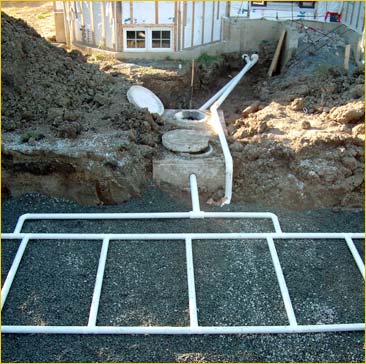People often forget all about their septic tanks once they’ve moved in but they do need to be desludged, generally once every year or every two years, depending on the size and use of the system (see last question). Other routine inspections can include checking mechanical equipment where it is installed and checking pipework for blockages. If that bit of maintenance is looked after, then there’s no reason why it shouldn’t be working fine — and be working for a very long time. If the septic tank has been neglected for too long, however, you may need to replace it.
Also know that surface water and rainwater from the roof should not be diverted to your wastewater system — in heavy rainfall this could cause solids to be flushed out of the tank.
More information available from the Protect Our Water leaflet.
When would I need to replace my treatment system?
A visual inspection should give you a good indication of whether or not there might be a leak; if you have any concerns contact the manufacturer. A poor performing tank is likely to be creating a health hazard, as it is likely to be polluting you and your neighbours’ land and underground waterways. It is your responsibility to replace your tank where deemed necessary.
If you had a packaged treatment system installed, (which were introduced on the market in the 1990s), again make sure the system has been well maintained.
Some homeowners may also be concerned that their use of bleach and other chemicals may harm the system. While research shows that most households don’t use enough to endanger the bacteria, in large quantities it can and it’s the biggest threat to your sewage system. Under no circumstances pour down paint thinners, e.g. white spirit, turpentine, etc., or motor oil down the drains – this must be disposed of in a dedicated facility (contact your local authority to see where the nearest one is). In the case of laundry powder and products such as floor cleaners, make sure to only use as much as the manufacturers recommend. In the case of cleaning products, empty the bucket of dirty water in two toilet bowls to dilute the effects of the chemicals. After a party, be mindful not to pour down the dregs of beer bottles in the sink all at once – a single pint has the same organic loading as sewage for one day. Instead, dispose of half a pint per flush in the toilet bowl.
What’s the definition of a wastewater treatment system?
Domestic wastewater treatment systems include all septic tanks, waste water tanks and treatment systems receiving, storing, treating or disposing of domestic waste water. It also includes all fittings and percolation areas associated with such tanks and systems and drains used to discharge waste water from a premises, whether or not a receiving tank is present.
NI’s septic tank requirements
You must apply for a discharge consent (form W02) with the Northern Ireland Environmental Agency (NIEA) to register your wastewater system. The fees vary depending on the type of discharge (between £109 and £273).
According to a 2015 study, the NIEA estimates that there are over 16,000 un-consented on-site wastewater treatment systems in Northern Ireland. After a consent to discharge has been issued there are no routine inspections of septic tanks. It is NIEA policy to initiate enforcement action only where a pollution incident is of high or medium severity.
ROI’s septic tank requirements
- You will have to register your septic tank online on the Protect Our Water website; the charge is €50.
- You will have to carry out a visual inspection of your tank every year, including making sure only domestic waste water is treated in the tank and that it is not discharging in streams and ditches; any repairs deemed necessary will have to be made by you
- The inspection regime, carried out by your local authority (free of charge) started in 2013 with priority given to high risk sites, in areas deemed to be sensitive, such as those near waterways.
- You will have to desludge your tank regularly, see next question.
How often does your septic tank need desludging?
This is how often you’ll need to desludge your septic tank, in years, if you’re occupying the house year-round:
| No. | of | people | |||||||
| Tank size (litres) |
1 |
2 |
3 |
4 |
5 |
6 |
7 |
8 |
9 |
| 2,250 | 5.8 | 2.6 | 1.5 | 1 | 0.7 | 0.4 | 0.3 | 0.3 | 0.1 |
| 3,400 | 9.1 | 4.2 | 2.6 | 1.8 | 1.3 | 1 | 0.7 | 0.6 | 0.4 |
| 4,500 | 12.4 | 5.9 | 3.7 | 2.6 | 2 | 1.5 | 1.2 | 1 | 0.8 |
| 5,700 | 15.6 | 7.5 | 4.8 | 3.4 | 2.6 | 2 | 1.7 | 1.4 | 1.2 |
| 6,800 | 18.9 | 9.1 | 5.9 | 4.2 | 3.3 | 2.6 | 2.1 | 1.8 | 1.5 |
| 8,000 | 22.1 | 10.7 | 6.9 | 5 | 3.9 | 3.1 | 2.6 | 2.2 | 1.9 |
Source: ROI Department of Housing
Are grants available?
There are grants in ROI but not for maintenance work. You must have received an advisory notice from the local authority requiring you to have the work done, i.e. your system needs to have been inspected. You can’t request an inspection from your local authority (they choose which sites to inspect).
The amount you can get depends on the income of the household, as per the table below:
| Household Income | % Costs Available | Maximum Grant |
|---|---|---|
| Up to €50,000 | 80% | €4,000 |
| €50,001 – €75,000 | 50% | €2,500 |
Note that the grant assistance is only be available to householders who have registered their system by February 1st 2013.




















